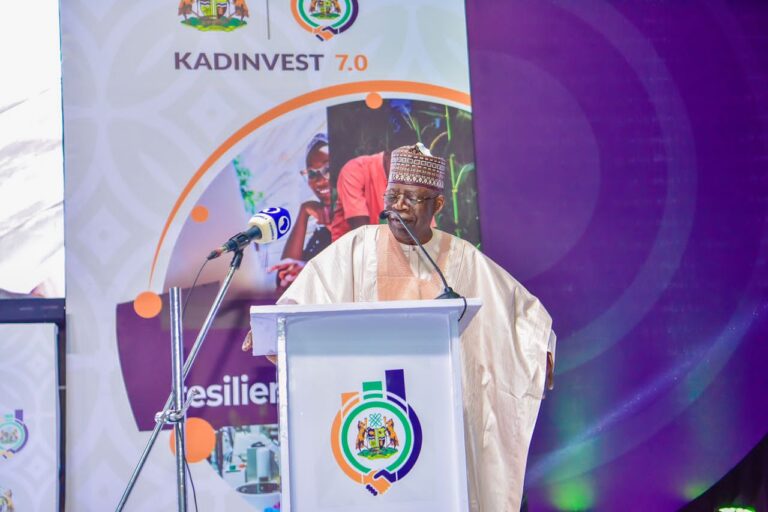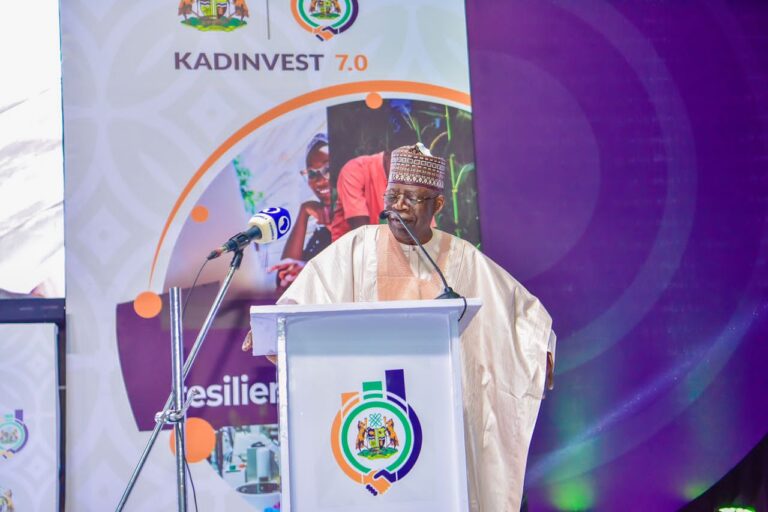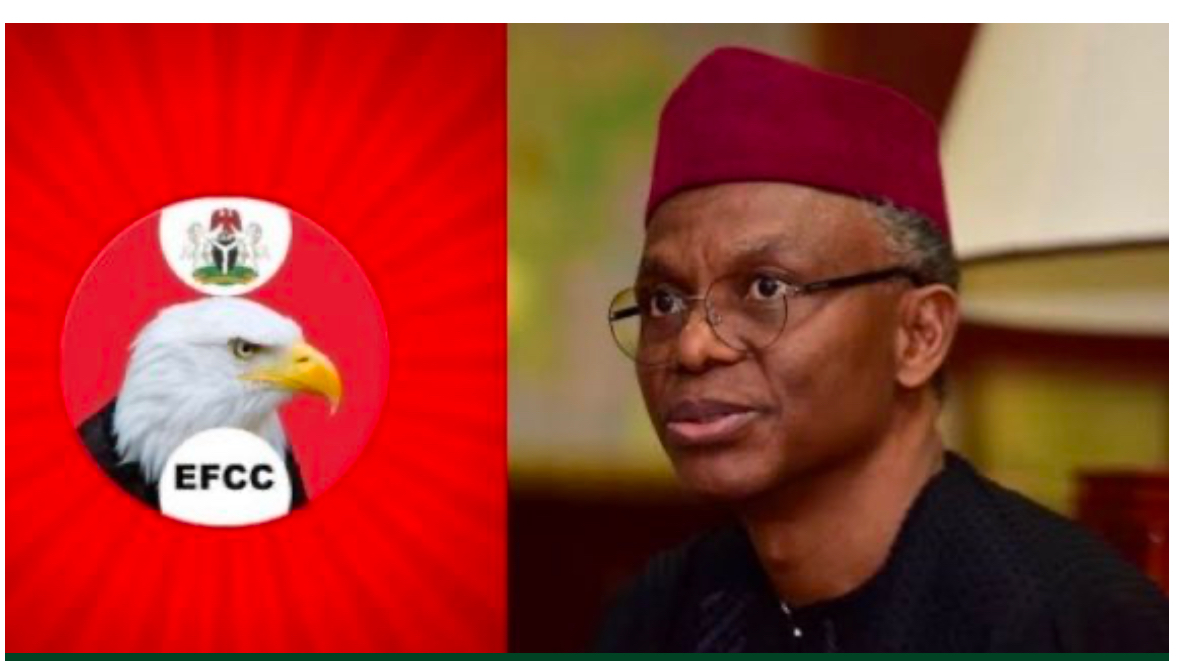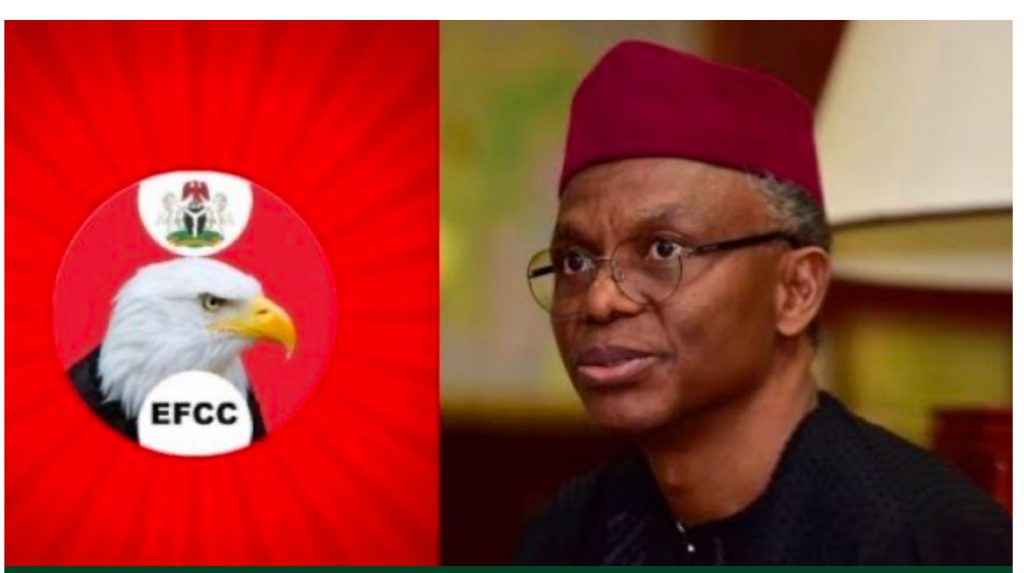news
2023 : Bola Tinubu share Part of his Manifesto’s at KadInvest, he promised to build a vibrant economy that will achieve double-digit Economic growth

 …says Kaduna people will reap El-Rufai’s economic efforts
…says Kaduna people will reap El-Rufai’s economic efforts
All Progressives Congress Presidential Candidate, Asiwaju Bola Ahmed Tinubu, has promised to build a vibrant economy that will achieve a double-digit growth when he becomes Nigeria’s president.
Asiwaju Tinubu said this in his speech at the 7th edition of Kaduna Economic and Investment Summit (KadInvest 7.0) on Saturday in Kaduna.
The APC presidential flagbearer hailed Kaduna State Governor Nasir el-Rufai for raising the bar in attracting investments to the state the same way he did in Lagos over 20 years ago.
“It is a great honour for me to be invited to give a speech on this occasion and it was a great pleasure listening to Governor Nasir El-Rufa’i as he shared with us the vision of how Kaduna State will attract and sustain investments.
“I would like to congratulate Kaduna State on this special occasion of the 7th edition of Kaduna Economic and Investment Summit (KadInvest 7.0). The theme for this year – Building a Resilient Economy – is very timely and appropriate. In a period of uncertainty in the global economy, it is important that we pursue a path of economic independence and insulation from global headwinds.
“I am particularly happy to be in an economic summit such as this. It reminds me of when we initiated Ehingbeti Lagos Economic Summit more than 20 years ago in Lagos State. Through the summit, Lagos State has been able to deliver landmark developmental projects in power generation, critical road infrastructure, street lightning, and clean energy initiatives, amongst others.
“Therefore, I am sure that under the able leadership of Your Excellency, Governor Nasir Ahmad El-Rufa’I, the leadership of the KADIPA, and subsequent administrations, Kaduna State will successfully collaborate with the private sector to usher in the investments in the priority sectors of technology, agriculture, manufacturing, infrastructure and solid minerals. These investments will in turn drive rapid economic growth and prosperity, providing jobs and opportunities for the good people of Kaduna State,” Tinubu said.
On the role of the private sector in the country’s economic development, Tinubu praised President Muhammadu Buhari for giving maximum support to them to flourish.
According to him, laws put in place by the Buhari administration helped to improve the ease of doing business in the country.
He said if elected, his administration will build on this, making it better for the private sector to excel.
“A vibrant private sector is a prerequisite for a functional state, playing a critical role in the mobilisation of capital, expertise and innovation for the creation of economic opportunities and employment. This is why it is important for the government to give maximum support and incentives to the private sector.
“In this light, President Muhammadu Buhari’s administration introduced a number of measures targeted at promoting private enterprises and businesses including the Repeal and Re-Enactment of the Companies & Allied Matters Act (CAMA), 2020, the passage of the Finance Act 2021, as well as the implementation of over 100 initiatives to improve ease of doing business in Nigeria.
“My desire is that the next administration, under my leadership, will continue to drive forward and accelerate on the progress made thus far, taking bold steps and initiatives to encourage investments in new areas typically considered risky, and leading the way by providing the enabling environment to nurture our innate entrepreneurial spirit.
“It is essential that our nation continues to champion the rule of law and sanctity of contracts, for these are the pre- requisites for creating a business-friendly economic environment.
“Whilst there must be active engagement between all the arms of government for the rule of law to prevail, it is critical for the judiciary to retain its autonomy and independence.
“Therefore, under my stewardship, the federal government will build on the efforts of the current administration to review, amend and/or enact the relevant laws that will engender the rule of law.
“My administration would ensure that the judiciary has true financial and administrative autonomy and strong disciplinary and integrity monitoring mechanisms,” Asiwaju Tinubu added.
He itemised his administration’s plans for the ensuring security returns to the country, stating the role of a secured nation in economic growth and development.
He noted that his administration will prioritise the training and retraining of the country’s security forces.
“We will be committed to introducing cross-sector initiatives that will address the economic and social constraints that prevent people from advancing or opting for crime.
Under my leadership, the government will place great emphasis on the use of a counter-insurgency doctrine and strategy by our military. We will continue to train and equip our gallant forces and security personnel with the resources, gear, and equipment that they need to hasten our inevitable march to resounding victory against enemies of our great nation. Where necessary, we will recruit and train more personnel to bridge any gaps in manpower.
“Furthermore, my administration will prioritise the use of superior aerial technology to deter criminal and terrorist activities, as well as to monitor and protect our critical national infrastructure including our network of pipelines, our power stations, our transmission and distribution networks, our sea and airports, our rail networks and other vital infrastructure,” he added.
“I will marshal a team of the most talented of Nigerians – men, women and youths – no matter their tribe and affiliations, to reset our nation on a path to achieve double-digit economic growth within a couple of years. We will do this through a coordinated set of policies in key sectors.
“We will champion an efficient government that will eliminate revenue and expense leakages across all federal government areas, leveraging technology, which will be increasingly embedded into government operations.
“In oil & gas, we will prioritise gas distribution and availability to power our industries.
“In agriculture, we will provide incentives for investments, machinery and equipment, expand and empower commodity boards, enhance our strategic grains reserves, encourage the formation of farm cooperatives and expand the scope and depth of access to finance for our farmers.
“In housing, we will introduce policies that will make it easier to transfer title and carry out transactions on landed properties. We will work with the private sector to significantly expand mortgage financing and we will provide credits and incentives to encourage real estate developers.
“We will collaborate with key technology partners to develop policies that promote the use and integration of technology across other sectors within the nation. We will work to accelerate the work that is being done with the private sector to train our youth and promote innovation through sponsored incubator hubs and science technology parks.

The APC candidate urged all Nigerians to join hands with him to work together to achieve the collective vision of building the Nigeria of our dreams.
news
BREAKING: Tinubu Names Tunji Disu Acting Inspector General After Egbetokun’s Exit


President Bola Tinubu has accepted the resignation of the Inspector-General of Police, Kayode Egbetokun, and approved the appointment of Tunji Disu as Acting Inspector-General of Police with immediate effect.
Our correspondent had earlier reported that Egbetokun tendered his resignation letter on Tuesday, citing pressing family considerations.
Appointed in June 2023, Egbetokun was serving a four-year term scheduled to conclude in June 2027, in line with the amended provisions of the Police Act.
In a statement issued on Tuesday by his Special Adviser on Information and Strategy, Bayo Onanuga, the President received the letter earlier on Tuesday and expressed appreciation for his service to the nation.
He also commended Egbetokun’s “decades of distinguished service to the Nigeria Police Force and the nation,” acknowledging his “dedication, professionalism, and steadfast commitment to strengthening internal security architecture during his tenure.”
“In view of the current security challenges confronting the nation, and acting in accordance with extant laws and legal guidance, President Tinubu has approved the appointment of Assistant Inspector-General of Police Tunji Disu to serve as Acting Inspector-General of Police with immediate effect.
“The President is confident that AIG Disu’s experience, operational depth, and demonstrated leadership capacity will provide steady and focused direction for the Nigeria Police Force during this critical period,” the statement read.
It added that in compliance with the provisions of the Police Act 2020, the President will soon convene a meeting of the Nigeria Police Council to formally consider Disu’s appointment as substantive Inspector-General of Police, after which his name will be forwarded to the Senate for confirmation.
The President reaffirmed his administration’s commitment to enhancing national security, strengthening institutional capacity, and ensuring that the Nigeria Police Force remains professional, accountable, and fully equipped to discharge its constitutional responsibilities.
news
Breaking : Nigeria Gets New Electoral Act as Tinubu Signs 2026 Reform Bill


President Bola Tinubu has signed the Electoral Act 2026 (Amendment) into law, days after the Independent National Electoral Commission (INEC) released the timetable for the 2027 general elections.
The signing ceremony took place at the State House, Abuja, at about 5:00pm on Wednesday, with principal officers of the National Assembly in attendance.
The National Assembly had on Tuesday passed the Electoral Act 2026 (Amendment) Bill.
The latest amendment comes amid intense public debate over the electronic transmission of election results in real time.
Last week, protests erupted at the National Assembly complex as civil society organisations and opposition figures mounted pressure on lawmakers to mandate live transmission of results from polling units directly to INEC’s central server.
The protesters argued that real-time transmission would reduce result manipulation and strengthen public confidence in the electoral process.
However, the ruling All Progressives Congress (APC) and some stakeholders have raised concerns about the technical feasibility of live transmission, particularly in communities with weak telecommunications infrastructure. They have argued for a phased or hybrid approach that would allow manual collation where electronic systems fail.
news
EFCC Extends El-Rufai’s Stay in Custody Amid ₦432bn Probe


Former Kaduna State Governor, Nasir El-Rufai, on Tuesday spent the second night in the custody of the Economic and Financial Crimes Commission, as his lawyer, A.U Mustapha (SAN), pushes for his release on bail.
There are, however, indications that the commission may seek a remand order to extend his stay in custody to enable him to respond to questions posed by investigators handling his matter.
The former governor arrived at the EFCC headquarters in Abuja on Monday around 10 a.m. for questioning in connection with an alleged N432bn corruption probe. He was, however, detained at the commission, where investigators continued to grill him.
An official of the commission who pleaded anonymity said the anti-graft agency was considering obtaining a remand order after the expiration of the hours allowed by law to enable investigators conclude questioning him.
“Forget the speculations being peddled on social media that he has been released. He has not. El-Rufai is still with us and will be spending another night in custody.
“He is very much with us and will remain so because the investigators are considering getting a remand order after the expiration of the 48 hours allowed by law.
“The investigators need some time with him to answer questions arising from his eight years as governor in Kaduna State,” the source said.
Speaking in a telephone conversation with The PUNCH on Tuesday, El-Rufai’s counsel, Mustapha, confirmed that the former governor remained with the anti-graft agency, while insisting that his client had fully cooperated with investigators.
He described his client as a responsible citizen who is not a flight risk if granted bail.
Mustapha said, “Well, as a responsible citizen, he was invited and, true to his word, he honoured the invitation.
“As we speak, he is still with the EFCC. He is cooperating to the best of his capacity, and we hope that the EFCC, given its integrity, will be kind enough to admit him to bail because he is presumed innocent, and I am sure if he is granted bail, he will not jump bail.
“He is a responsible citizen, and everybody knows him. He came to Nigeria on his own volition. He wrote a letter that he was going to honour the EFCC invitation, and he kept his word as a man of integrity. We’re hopeful that very soon he will be granted bail.”
When asked about the specific allegations against his client, Mustapha declined to offer details.
“You’re asking the right question from the wrong person. That question can only be answered by the EFCC and not by me. I would just be speculating, and lawyers don’t do that.”
Pressed further on whether he witnessed parts of the interrogation and what it was about, Mustapha responded, “That would be prejudicial. It’s a confidential matter and not meant for public consumption.”
The EFCC’s interrogation is linked to the report of an ad hoc committee of the Kaduna State House of Assembly set up in 2024 to probe finances, loans, and contracts awarded between 2015 and 2023 during El-Rufai’s administration.
EFCC extends El-Rufai detention, Plateau indigenes killed, other top stories
Rep backs real-time electronic transmission of election results
The committee, chaired by Henry Zacharia, had alleged that several loans obtained during the period were not utilised for their intended purposes.
While presenting the report, the Speaker, Yusuf Dahiru Leman, claimed that about N423bn was allegedly siphoned under the former governor’s administration.
The committee recommended the investigation and prosecution of El-Rufai and some former cabinet members over alleged abuse of office, diversion of public funds, money laundering, contract awards without due process, and reckless borrowing.
The Assembly subsequently forwarded petitions to the EFCC and the Independent Corrupt Practices and Other Related Offences Commission.
El-Rufai has denied the allegations, describing the probe as politically motivated, and insisted that loans obtained during his tenure were properly appropriated and used for infrastructure, education, healthcare, and security.
On Monday, an EFCC source said the commission had been investigating the matter for about a year, noting that suspects are usually invited after investigations have reached an advanced stage.
“The commission has been investigating him for about a year now. As a commission, we don’t just rush to invite suspects. Persons accused are always the last; that is, after we might have done our investigation to an advanced stage.
“We are investigating him on the allegations against him by the Kaduna State Assembly,” the source said.
Meanwhile, in a separate development, the Department of State Services has filed criminal charges against El-Rufai before the Federal High Court in Abuja over alleged unlawful interception of the phone communications of the National Security Adviser, Nuhu Ribadu.
The three-count charge, marked FHC/ABJ/CR/99/2026, was filed under the Cybercrimes (Prohibition, Prevention, etc.) Amendment Act, 2024, and the Nigerian Communications Act, 2003.
According to the charge sheet, El-Rufai allegedly admitted during a February 13, 2026, appearance on Arise TV’s Prime Time Programme that he and unnamed associates unlawfully intercepted Ribadu’s communications.
Count One alleged that El-Rufai “did admit during the interview that you and your cohorts unlawfully intercepted the phone communications of the National Security Adviser, Nuhu Ribadu,” an offence said to be punishable under Section 12(1) of the Cybercrimes Amendment Act.
Count Two accused him of acknowledging knowledge of an individual involved in the alleged interception without reporting it to security agencies, while Count Three alleged that he and others still at large used technical equipment that compromised public safety and national security.
The prosecution further claimed that the alleged act, reportedly admitted during the television interview, caused “reasonable apprehension of insecurity among Nigerians.”
He is yet to be arraigned.
-

 news5 years ago
news5 years agoUPDATE: #ENDSARS: CCTV footage of Lekki shootings intact – Says Sanwo – Olu
-

 lifestyle6 years ago
lifestyle6 years agoFormer Miss World: Mixed reactions trail Agbani Darego’s looks
-

 health5 years ago
health5 years agoChairman Agege LG, Ganiyu Egunjobi Receives Covid-19 Vaccines
-

 lifestyle4 years ago
lifestyle4 years agoObateru: Celebrating a Quintessential PR Man at 60
-

 health6 years ago
health6 years agoUPDATE : Nigeria Records 790 new cases of COVID-19
-

 health6 years ago
health6 years agoBREAKING: Nigeria confirms 663 new cases of COVID-19
-

 entertainment1 year ago
entertainment1 year agoAshny Set for Valentine Special and new Album ‘ Femme Fatale’
-

 news9 months ago
news9 months agoBREAKING: Tinubu swears in new NNPCL Board


